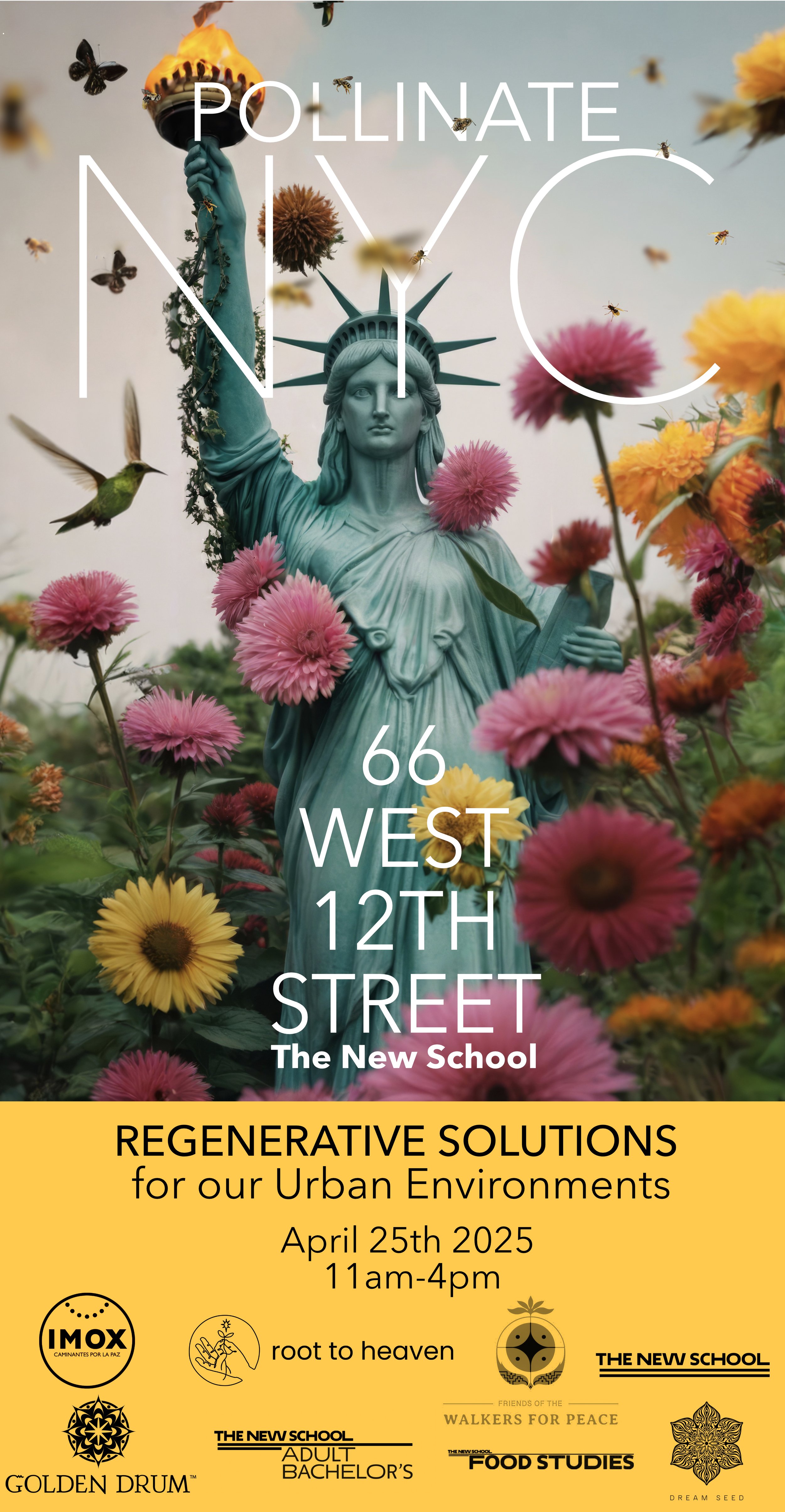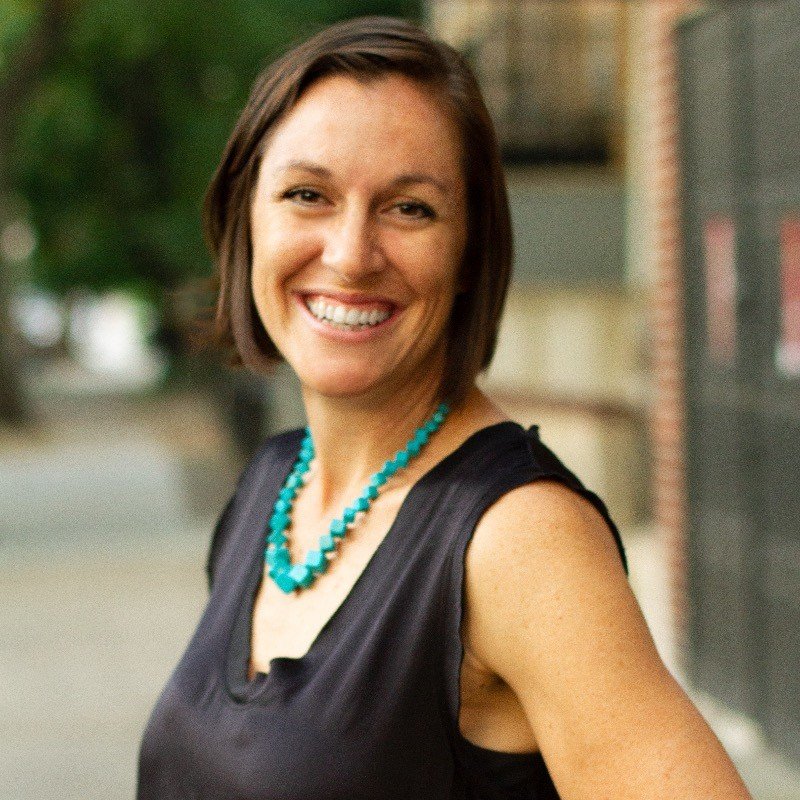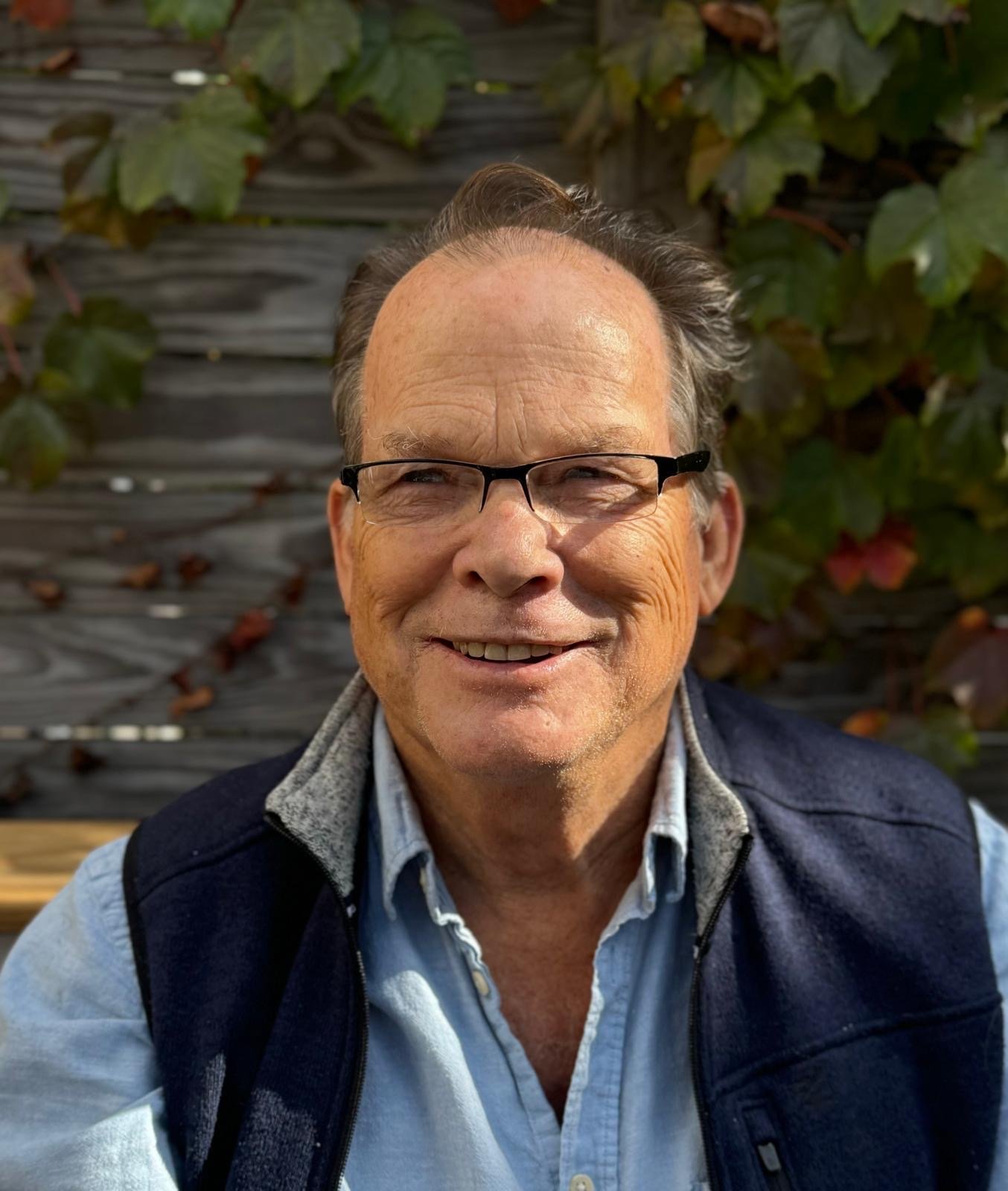Pollinate NYC
Design by Law Stewart
PROGRAM
Opening Prayers with representatives from the Ramapough Lenape Nation
Panel on the city & regional food systems, indigenous food ways, urban pollination, food security and community resiliency.
Cultural exchange with project partners from 6 nations’ Akwesasne Freedom School and the Mayan Tz’utujil Nation
Introduction to Pollinate NYC
Concert by Dream Seed
Q & A
Closing Remarks
Join us on Friday, April 25th from 11am-4pm, for Pollinate NYC, the launch of Root to Heaven’s new initiative in partnership with The New School’s Food Studies Program, Heart & Mind Festival, and Golden Drum.
This event is a fundraiser to support environmentally regenerative projects with Akwesasne Freedom School and Walkers for Peace.
***Tickets are sliding scale, please pay what you can.
***Seating is limited, please register in advance to reserve your spot!
All tickets purchased are 100% tax deductible through Root to Heaven’s 501(c)3 status.
Long before the built environment rose as a dense grid of canyons and skyscrapers, Manhattan was home to the Lenape Natives. Its Munsee name of manaháhtaan means the place to gather (the wood) for bows.
A recreation of Mannahatta circa 1609.Credit...Markley Boyer/The Mannahatta Project, via Wildlife Conservation Society via NY Times
Lower Manhattan in the early 21st century.Credit...Stephen Amiaga/Wildlife Conservation Society via NY Times
Surrounded by a brackish estuary and tidal rivers, NYC’s marshy, grassland soil was originally a vibrant ecosystem teaming with biodiversity and home to over 130 native species of flora and countless fauna. “For millennia the waters and wetlands, woodlands and grasslands were inhabited by a large diversity of species. Deer, elk, moose, wood bison, black bear, fox, cougar, bobcat, and lynx roamed our forests. Beavers built dams on freshwater streams, otters made their homes in rivers and ponds. Early colonists described spring fish runs as so thick a man could walk across a river on their backs. Striped bass, shad, alewives and other river herring — these were the fish that migrated by the hundreds of thousands from the ocean and crowded into our rivers and streams to spawn in fresh inland waters.”
-Betsy McCully, New York Wildlife
In many cases, the Indigenous concept of the US places the same value on nature as it does on a fellow human, there is often no distinction between a child, a tree, a whale, a river, a mountain, or a grandparent. There is no distinction because the knowledge of innate connection between all species and what we deem as inanimate nature is observed and respected. The practice of living in a way that benefits 7 generations to come is widespread, with the understanding that when someone throws a stone into water, what ripples in one place will ripple everywhere.
Indigenous people are responsible for protecting 80% of the world’s biodiversity, a fact that is recognized in global treaties and policies. The neural, genetic and subatomic connectivity of species established in science was represented and recorded in ancient knowledge ways long before it was measured by modern practice.
POLLINATE NYC IS A MULTI-YEAR, MULTI-LAYERED INITIATIVE PROVIDING SOLUTIONS TOWARDS:
Native Urban Reforestation and Agroforestry
Education
Preservation and respectful dissemination of traditional indigenous wisdom
Hunger and Food Sovereignty
Inclusion & Belonging
Resource Sharing & Community Resiliency
We launch this initiative with partners including The New School University, Root to Heaven founder’s Alma Mater. With deep roots in Indigenous activism and assembly, alongside a rich Food Studies Program, The New School is the chosen launch pad for Pollinate NYC.
Pollinate NYC is a pilot project of a new Practice to Policy Engagement lab led by Thomas Forster, New School Food Studies part-time faculty member and urban-rural linkages specialist.
learn more about root to heaven
Indigenous Wisdom Keepers
Nana Marina Cruz is an Ajq'ij (spiritual guide) of the Tz ́utujil People of Guatemaya. She is the daughter of Tata Pedro & works not just as a healer and therapist with natural folk methods, but as a ceremonial leader of fire, tobacco, cacao and temescal. She is a teacher of the Mayan calendar and the Mayan cosmovision. She works closely with the midwives of her community to coordinate prenatal, birth, and postpartum care. She emphasizes the importance of being truly connected in body and spirit. She believes that all things have a meaning, every emotion, every disease, and that these energies all have their origin. It is by finding the origin, that we can truly heal the spirit and body.
“I always loved music, and I realized later that I had a gift for songwriting around the age of 29. When I look back and think about it, I always had this beautiful gift, but I didn’t realize what I had. I remember when I was riding the bus to school I could hear music coming to me. I look around and there was no radio playing. It was a melody coming that only I could hear. So I would hum the melody I was hearing. As I got older, I first began writing songs that were in Mohawk for our Traditional Women’s singing group called, ‘Kontiwennenhawi’, (Carriers of the Words). In 2001 my family had a house fire. After this house fire, my family was going through tough times trying to pay bills and trying to put money aside to build a house. One day, I got the idea that I should try and write songs in English. I can write songs in Mohawk maybe I can write songs in English too. The first song that I wrote in English was, ‘Broken.’ The second song that came to me to write was called, ‘Rich Girl.’ So, these are the beginnings of songwriting and singing for me. I began making CDs, and it helps to have them to make ends meet.
When I write a song, I run it by my family first. I have five children; I have one girl and four boys. I remember when I sang them ‘Rich Girl’ for the first time—my kids loved it. It made my daughter cry.”
Steven Smith, Esquire (Owl)
Steven Smith received his bachelor of arts in political science from the University of California at Santa Cruz and his doctorate of jurisprudence from the University of California at Berkeley. Mr. Smith studied Mexican culture and history as a Pacific Rim scholar of the University of California for which he wrote an essay on an afro-mestizo community on the pacific coast of Mexico. Mr. Smith has traveled and lived extensively in Latin America and the Caribbean including Mexico, Cuba, Haiti, Guyana and Ecuador.
Mr. Smith has taught and lectured on a wide variety of subjects including business law at Virginia Tech, science, technology and law for Virginia Tech and the University of Richmond School of Law, and introductory law for high school students. He has lectured on diverse subjects such as telecommunications policy, trade policy, environmental law, and the human rights of indigenous people. Steven Smith is a member of the California bar and Virginia bar of attorneys. Mr. Smith has assisted Navajo, Tohono O’odham, and Guyanese villagers with major environmental issues in national courts and before Congress and the United Nations.
Mr. Smith is currently an advisor to the Ramapough.
YUBE HUNIKUIN
Yube Huni Kuin is the Vice President of the Federation (Fepach) which oversees 108 Huni Kuin villages in the state of Acre in the Brazilian Amazon. Yube is a political and spiritual leader that radiates joy, gratitude, forgiveness, and his love for the forest and nature.
Yube Huni Kuin is often referred to as the Buddha of the rainforest. Coming from a long tradition of Huni Kuin, he is one of the main carriers of the traditional Huni Kuin songs and ancestral stories his elders have passed on to him.
He is an agro-forestry specialist and was Secretary of AMAAIAC (Association Movement of Indigenous Agroforestry Agents of Acre) from 2002 to 2008 and the advisor for Indigenous Affairs with the Government of the State of Acre from 2011 until 2019. He is also one of the few Huni Kuin to have travelled all over the 108 Huni Kuin villages to document his culture and come from a long lineage of indigenous rights activists who have demarcated what is know today as the Huni Kuin territory.
Levi Herne (Tehonwenhniseráthe) was both born into a family who prioritized their traditional knowledge by providing an environment for learning their traditional language and culture to maintain relationships with the natural world. Growing up, Levi was taught by elders within his community and graduated from the Akwesasne Freedom School. Through his unique educational experience, Levi developed a passion for utilizing traditional practices for growing and harvesting indigenous foods, plants, and trees. His efforts to learn and share the knowledge passed down by his elders and ancestors is how he continues his responsibility as Onkwehón:we (Original People).
Waylon Cook
Waylon has dedicated his career to culture and language revitalization efforts and continues to work towards reversing the effects of colonialism to the Mohawk culture and language.
He is a 2019 graduate of the 2 year Kanien’keha Ratiwennahni:rats Mohawk Immersion Language program and has been a life-long learner of the Mohawk language. Upon graduating,he taught at the Akwesasne Freedom School in a full mohawk immersion setting for levels 3 and 4. He holds knowledge of local plant medicines and has taught Hotinonhson:ni youth and community members about the proper protocols of harvesting and uses of local medicine plants and wild food plants.
He previously worked as a coordinator for the Ionkwa’nikonri:io Thompson Island Cultural Camp. His work at the camp ensured he continued learning from community knowledge holders to ensure local youth had a place to reconnect with the natural world and maintain their cultural identity.
During his time as the Camp Coordinator, Waylon also managed and secured vital funding through community grants and various federal government funding sources. His focus was to secure infrastructure funding and cultural programming funding for the long-term operation of the camp.
Akwesasne Freedom School The Akwesasne Freedom School was founded in 1979 in a grass-roots effort by the Mohawk tribe. The Akwesasne Freedom school is located in St. Regis Mohawk Reservation, New York. It was founded with the intention of strengthening the Mohawk culture which was once in danger of being extinct.
Pollinator Panelists
Rella Abernathy is a Senior Ecologist with the Nature Based Solutions Team from the City of Boulder Colorado’s Climate Initiatives Department. Throughout Rella’s career, she has been interested in the connections and relationships between different forms of life, how they communicate, and how they affect each other as individuals and their wider environments. The role that people play within living systems and how we interact with our land, water and each other is central to Rella’s current work. In her role at the city, she collaborates closely with others who have diverse experiences, knowledge and approaches to collectively co-create solutions that reduce climate-related risks, build biodiversity and resilience, while improving the safety and wellbeing of our communities.
Kim Calichio is the Co-founder and Development Director at Connected Chef, a NY-based, grass-roots, community organization re-envisioning food access to ensure every NYC household has local, nutritious food every week. She is of Italian and Irish descent and the mother of 2 active boys. With a background studying psychology and public health and with professional experience as a chef in the NYC restaurant industry, Kim has dedicated the last 15 years to building community through food. When COVID-19 hit in 2020, Kim’s worlds collided when the restaurant industry collapsed in NYC, and her community was left without a safety net. At this moment, she worked with her neighbors and restaurant workers to create The Connected Chef Foundation, Inc., and has spent the last five years collaboratively building a community-controlled food system that sources ingredients from local BIPOC farmers and distributes them on a sliding scale across Queens County. She dedicates her time to ensuring that the Connected Chef’s model builds sovereignty within the Queens community and uplifts the experiences and voices of those around her.
Lena Cole, a native New Yorker born and raised in the vibrant tapestry of the city, carries a profound legacy from her upbringing at ABC Carpet and Home. With seven years immersed in experiential wisdom traditions globally, Lena has cultivated a deep capacity for ceremonial work and community stewardship.
Since the onset of COVID-19, Lena has dedicated herself to building community networks and collaborating with grassroots organizations, particularly in land stewardship and climate activism. Her efforts have centered around hosting transformative climate gatherings, empowering collective action, and fostering sustainable practices while living on land in Upstate New York.
She focuses energy on shifting financial paradigms through impact investing networks, and working with organizations like Daughters for Earth to shift our current investment landscape and get more funding to the women and leaders who are often cast out of traditional funding frameworks. She seeks to empower local economies that can help generate capital for projects aligning their creative process with nature.
Currently pursuing a Masters in Global Thought at Columbia University, Lena aims to integrate her esoteric wisdom with rigorous academic frameworks. Her background in Media Studies fuels her passion for innovative storytelling, aiming to elevate untold narratives that are inlaid in projects and organizations, where she strives to amplify marginalized voices and expand collective consciousness.
Columba González-Duarte Through her research, Columba examines the conservation dynamics of the monarch butterfly across three nations, analyzing the connections between NAFTA’s agri-food industry, labor migration, and the decline of the monarch population. She also collaborates with scientific and Indigenous communities in Canada, the United States, and Mexico to document their knowledge and ways of relating to migratory insects.
Dr. Gonzalez-Duarte’s academic practice is shaped by feminist ethics of care, promoting a different form of justice that values the well-being of both humans and more-than-humans during their migratory journeys across North America.
Gil Lopez is a social pollinator and community cultivator who is the co-founder of multiple guerrilla gardens, including Smiling Hogshead Ranch. He serves on the Queens Solid Waste Advisory Board and advisory committee for Western Queens Community Land Trust and the Dutch Kills Loop. An environmental educator, community organizer, master composter and activist, Gil works towards liberation through community building. On Insta @glopezsez
Musical Guests
DREAM SEED IS A MULTI-CULTURAL MUSIC ENSEMBLE CREATED BY MEMBERS OF GOLDEN DRUM, THE HEART AND MIND FESTIVAL AND DIDGE PROJECT. CHANTING, MANTRAS, OVERTONE SINGING, NATIVE AMERICAN SONGS, INDIGENOUS MUSIC, DIDGERIDOOS, CRYSTAL SINGING BOWLS, BELLS, GONGS, HARMONIUMS, TUNING FORKS AND OTHER OVERTONE-EMITTING INSTRUMENTS ARE USED TO CREATE AN ENVIRONMENT CONDUCIVE TO DEEP RELAXATION AND INWARD INVESTIGATION. PARTICIPANTS ARE LED THROUGH GUIDED MEDITATIONS AND PRACTICES DESIGNED TO HARMONIZE BODY, MIND AND SPIRIT.
Hosts
For nearly 40 years, the dynamic relationship of cities and towns to their rural hinterlands through the lens of the food system have been at the heart of my personal, professional and policy interests. From rural towns and small islands to major cities around the world I have worked to improve urban rural linkages through strengthening city region food systems.
I have had direct experience in smallholder farming and working with family farmers, creating marketing cooperatives, providing access to land and credit, and in building organizations and campaigns advocating for policies to support good practices. Some of these policies have been to support community food systems, sustainable public food procurement and strengthening urban-rural linkages. For over 30 years I have been engaged in campaigns for international sustainable food and agriculture policy from the first Rio Earth Summit (1992) to the UN Food Systems Summit (2021) to biodiversity and ecosystem restoration summits.
For 18 years I have been on the faculty of the New School Food Studies Program, teaching courses on the practical engagement by civil society in food and farm policy at city, national and international levels.
Nicole Adriana Casanova is a Boriken born student of Maestro Manuel Rufino, a Taino Elder who founded the Golden Drum cultural center in Brooklyn and many communities around the world. She is a graduate of the New School of Public Engagement in New York City. Her cross-disciplinary study included Food Justice and Sovereignty, Environmental Economics, and Psychology.
Nicole is an artist, a writer, poet, songkeeper and storyteller who has travelled the world learning and sharing traditional knowledge. As a student of initiation and the intertribal altar, she is a servant to humanity and the Earth. Root to Heaven is Nicole’s prayer for the Waters of the World.
Join us to learn more about how you can get involved and support Pollinate NYC on Friday, April 25th from 11am-4pm
***This event is a fundraiser to support environmentally regenerative projects with Akwesasne Freedom School and Walkers for Peace.
All tickets purchased are 100% tax deductible through Root to Heaven’s 501(c)3 status.



















